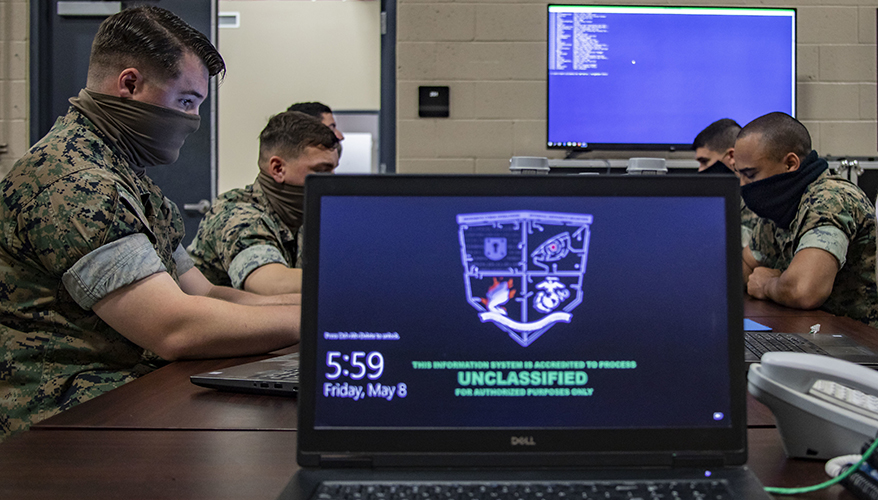MARINE CORPS NEWS
MDM News: Marine Corps Cyber, Intel Units Aim to Get ‘Smaller, Lighter, Faster’
By Josh Luckenbaugh

Marines photo
WASHINGTON, D.C. — The Marine Corps has stood up a new program office for both intelligence and cyber operations, and the fledgling organization is focused on reducing the size of equipment while increasing its relevance for the warfighter.
Col. Thomas Dono, program manager for intelligence systems and cyberspace operations at the Marine Corps’ Program Executive Office Land Systems, said his organization is just three months old. The service previously had separate program offices for intelligence and cyber operations, but the Marine Corps decided “there's enough synergy there between the two capability sets” and combined the two organizations into one, Dono said at the Modern Day Marine conference April 30.
Dono said his portfolio is divided into three buckets: sensors to “look at all the domains,” from things that can be seen or heard to “the other different things that we can't physically see” such as in the radio frequency spectrum or cyber domain; making sense of the data received from the sensors to develop intelligence, which can then be disseminated within the Marine Corps or to the “intelligence community at large”; and non-kinetic effects.
A major focus for the new program office is migrating capabilities to the cloud, he said.
The Marine Corps has large legacy systems, and “we're in the process right now of containerizing our software” and breaking it up into apps “where we can then containerize it and then start fielding it a little bit better for our systems,” he said. This will allow the service to become “more tactical.”
“A lot of these virtual machines are kind of computationally heavy … and so we're trying to get smaller, lighter, faster,” he said. “As we start to develop our software, containerize our software and make it more modular and mobile, we can then go to smaller systems and then push some of that capability down to our more tactical units.”
Areas where industry can help with this transition are with systems for development, security and operations — “how do I containerize that software, move the software faster, update it more quickly and make it more relevant to the warfighter?” — solutions for cross-domain operations, reducing form factors and new sensors, Dono said.
“We want to be able to look at the world in a bunch of different and exciting ways so that we can then … maintain contact with all the forces that are out there … and then understand what they're doing so we can make” the right decisions, he said.
Another area of interest is artificial intelligence and machine learning “to help me … sift through that data,” Dono said. These technologies won’t replace human intelligence analysts but rather will make their analysis “more thoughtful, and we can use humans for what humans do best in my opinion, which is critical thinking.”
AI will do the “dull, dirty and dangerous work with the massive amounts of data that potentially can be structured or unstructured in order to help the people do that critical thinking and put their attention where it needs to be,” he said.
“Right now, you have information … and the data is information, but the people need to use their intellect to then break it down into intelligence,” he said. AI will help “scale that down and say, ‘I think this is important, I don’t think this is important,’” allowing operators to focus on the key pieces of data.
“I don't have a crystal ball, but I don't think that computers are going to be able to do that, at least within our lifetime,” he said. “I might be proven wrong, so we’ll see.”
Topics: Cyber, Cybersecurity
